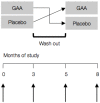Supplementation with Guanidinoacetic Acid in Women with Chronic Fatigue Syndrome
- PMID: 26840330
- PMCID: PMC4772036
- DOI: 10.3390/nu8020072
Supplementation with Guanidinoacetic Acid in Women with Chronic Fatigue Syndrome
Abstract
A variety of dietary interventions has been used in the management of chronic fatigue syndrome (CFS), yet no therapeutic modality has demonstrated conclusive positive results in terms of effectiveness. The main aim of this study was to evaluate the effects of orally administered guanidinoacetic acid (GAA) on multidimensional fatigue inventory (MFI), musculoskeletal soreness, health-related quality of life, exercise performance, screening laboratory studies, and the occurrence of adverse events in women with CFS. Twenty-one women (age 39.3 ± 8.8 years, weight 62.8 ± 8.5 kg, height 169.5 ± 5.8 cm) who fulfilled the 1994 Centers for Disease Control and Prevention criteria for CFS were randomized in a double-blind, cross-over design, from 1 September 2014 through 31 May 2015, to receive either GAA (2.4 grams per day) or placebo (cellulose) by oral administration for three months, with a two-month wash-out period. No effects of intervention were found for the primary efficacy outcome (MFI score for general fatigue), and musculoskeletal pain at rest and during activity. After three months of intervention, participants receiving GAA significantly increased muscular creatine levels compared with the placebo group (36.3% vs. 2.4%; p < 0.01). Furthermore, changes from baseline in muscular strength and aerobic power were significantly greater in the GAA group compared with placebo (p < 0.05). Results from this study indicated that supplemental GAA can positively affect creatine metabolism and work capacity in women with CFS, yet GAA had no effect on main clinical outcomes, such as general fatigue and musculoskeletal soreness.
Keywords: cellular bioenergetics; creatine; exercise performance; general fatigue.
Figures
Similar articles
-
Guanidinoacetic acid with creatine compared with creatine alone for tissue creatine content, hyperhomocysteinemia, and exercise performance: A randomized, double-blind superiority trial.Nutrition. 2019 Jan;57:162-166. doi: 10.1016/j.nut.2018.04.009. Epub 2018 May 17. Nutrition. 2019. PMID: 30170305 Clinical Trial.
-
Six-Week Oral Guanidinoacetic Acid Administration Improves Muscular Performance in Healthy Volunteers.J Investig Med. 2015 Dec;63(8):942-6. doi: 10.1097/JIM.0000000000000212. J Investig Med. 2015. PMID: 26079223 Clinical Trial.
-
Guanidinoacetic acid loading affects plasma γ-aminobutyric acid in healthy men.Eur J Nutr. 2015 Aug;54(5):855-8. doi: 10.1007/s00394-015-0858-5. Epub 2015 Feb 14. Eur J Nutr. 2015. PMID: 25680689 Clinical Trial.
-
Guanidinoacetic acid as a performance-enhancing agent.Amino Acids. 2016 Aug;48(8):1867-75. doi: 10.1007/s00726-015-2106-y. Epub 2015 Oct 7. Amino Acids. 2016. PMID: 26445773 Review.
-
Safety of Dietary Guanidinoacetic Acid: A Villain of a Good Guy?Nutrients. 2021 Dec 24;14(1):75. doi: 10.3390/nu14010075. Nutrients. 2021. PMID: 35010949 Free PMC article. Review.
Cited by
-
Low Tissue Creatine: A Therapeutic Target in Clinical Nutrition.Nutrients. 2022 Mar 15;14(6):1230. doi: 10.3390/nu14061230. Nutrients. 2022. PMID: 35334887 Free PMC article. Review.
-
Dietary and nutrition interventions for the therapeutic treatment of chronic fatigue syndrome/myalgic encephalomyelitis: a systematic review.J Hum Nutr Diet. 2017 Jun;30(3):247-259. doi: 10.1111/jhn.12435. Epub 2017 Jan 22. J Hum Nutr Diet. 2017. PMID: 28111818 Free PMC article.
-
"Heads Up" for Creatine Supplementation and its Potential Applications for Brain Health and Function.Sports Med. 2023 Dec;53(Suppl 1):49-65. doi: 10.1007/s40279-023-01870-9. Epub 2023 Jun 27. Sports Med. 2023. PMID: 37368234 Free PMC article. Review.
-
Nutraceutical Supplementation Effects on Subjective Fatigue Symptoms in Myalgic Encephalomyelitis/Chronic Fatigue Syndrome: A Systematic Review.Cureus. 2025 Jul 2;17(7):e87178. doi: 10.7759/cureus.87178. eCollection 2025 Jul. Cureus. 2025. PMID: 40755709 Free PMC article. Review.
-
Effects of Creatine Supplementation on Brain Function and Health.Nutrients. 2022 Feb 22;14(5):921. doi: 10.3390/nu14050921. Nutrients. 2022. PMID: 35267907 Free PMC article. Review.
References
-
- Avellaneda Fernández A., Pérez Martín A., Izquierdo Martínez M., Arruti Bustillo M., Barbado Hernández F.J., de la Cruz Labrado J., Díaz-Delgado Peñas R., Gutiérrez Rivas E., Palacín Delgado C., Rivera Redondo J., et al. Chronic fatigue syndrome: Aetiology, diagnosis and treatment. BMC Psychiatry. 2009;9:S1. doi: 10.1186/1471-244X-9-S1-S1. - DOI - PMC - PubMed
-
- Block W., Träber F., Kuhl C.K., Keller E., Lamerichs R., Karitzky J., Rink H., Schild H.H. 31P-mr spectroscopy of peripheral skeletal musculature under load: Demonstration of normal energy metabolites compared with metabolic muscle diseases. Rofo. 1998;168:250–257. doi: 10.1055/s-2007-1015121. - DOI - PubMed
Publication types
MeSH terms
Substances
LinkOut - more resources
Full Text Sources
Other Literature Sources
Medical
Miscellaneous



